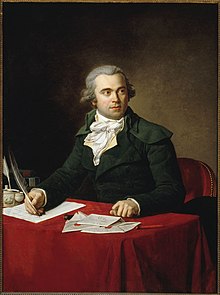Jules-François Paré: Difference between revisions
No edit summary Tags: Mobile edit Mobile web edit |
Tags: Mobile edit Mobile web edit |
||
| Line 5: | Line 5: | ||
==Life== |
==Life== |
||
Paré attended the collège in Troyes. When he was to have his hands rapped as punishment, his classmate and friend [[Georges Jacques Danton]] defended him and spoke out against corporal punishment in class. Danton spoke so persuasively that the head of the school decided to ban the practice.<ref>{{Cite book|last=Dwyer|first=Frank|url=http://archive.org/details/georgesjacquesda0000dwye|title=Georges Jacques Danton|date=1987|publisher=New York : Chelsea House|others=Internet Archive|isbn=978-0-87754-519-4}}</ref> Paré first became a clerk during his studies in [[Paris]] and then, thanks to his employer's support, received the post of departmental commissar and then of secretary to the provisional executive council when Georges Danton was summoned to the Ministry of Justice. On 20 August 1793 he was made Minister of the Interior to replace [[Dominique Joseph Garat]]. Denounced as a "new Roland" by [[François-Nicolas Vincent]] and [[Jacques René Hébert]] and as a "Dantoniste" by [[Georges Couthon]], he was dismissed on 5 April 1794, but escaped punishment, particularly the [[guillotine]] which awaited his protector. Under the [[French Directory]], from 1796 he was commissaire to the Seine department and then administrator of military hospitals, and under the [[First French Empire]] he was made landowner of the small property in [[Champagne, France|Champagne]]. |
|||
{{s-start}} |
{{s-start}} |
||
Revision as of 22:29, 24 May 2023

Jules François Paré (11 August 1755 in Rieux, Marne – 29 July 1819 in Rieux) was a French politician.
Life
Paré attended the collège in Troyes. When he was to have his hands rapped as punishment, his classmate and friend Georges Jacques Danton defended him and spoke out against corporal punishment in class. Danton spoke so persuasively that the head of the school decided to ban the practice.[1] Paré first became a clerk during his studies in Paris and then, thanks to his employer's support, received the post of departmental commissar and then of secretary to the provisional executive council when Georges Danton was summoned to the Ministry of Justice. On 20 August 1793 he was made Minister of the Interior to replace Dominique Joseph Garat. Denounced as a "new Roland" by François-Nicolas Vincent and Jacques René Hébert and as a "Dantoniste" by Georges Couthon, he was dismissed on 5 April 1794, but escaped punishment, particularly the guillotine which awaited his protector. Under the French Directory, from 1796 he was commissaire to the Seine department and then administrator of military hospitals, and under the First French Empire he was made landowner of the small property in Champagne.
References
- ^ Dwyer, Frank (1987). Georges Jacques Danton. Internet Archive. New York : Chelsea House. ISBN 978-0-87754-519-4.
- Histoire et dictionnaire de la Révolution française 1789-1799 by Jean Tulard, Jean-François Fayard, Alfred Fierro
